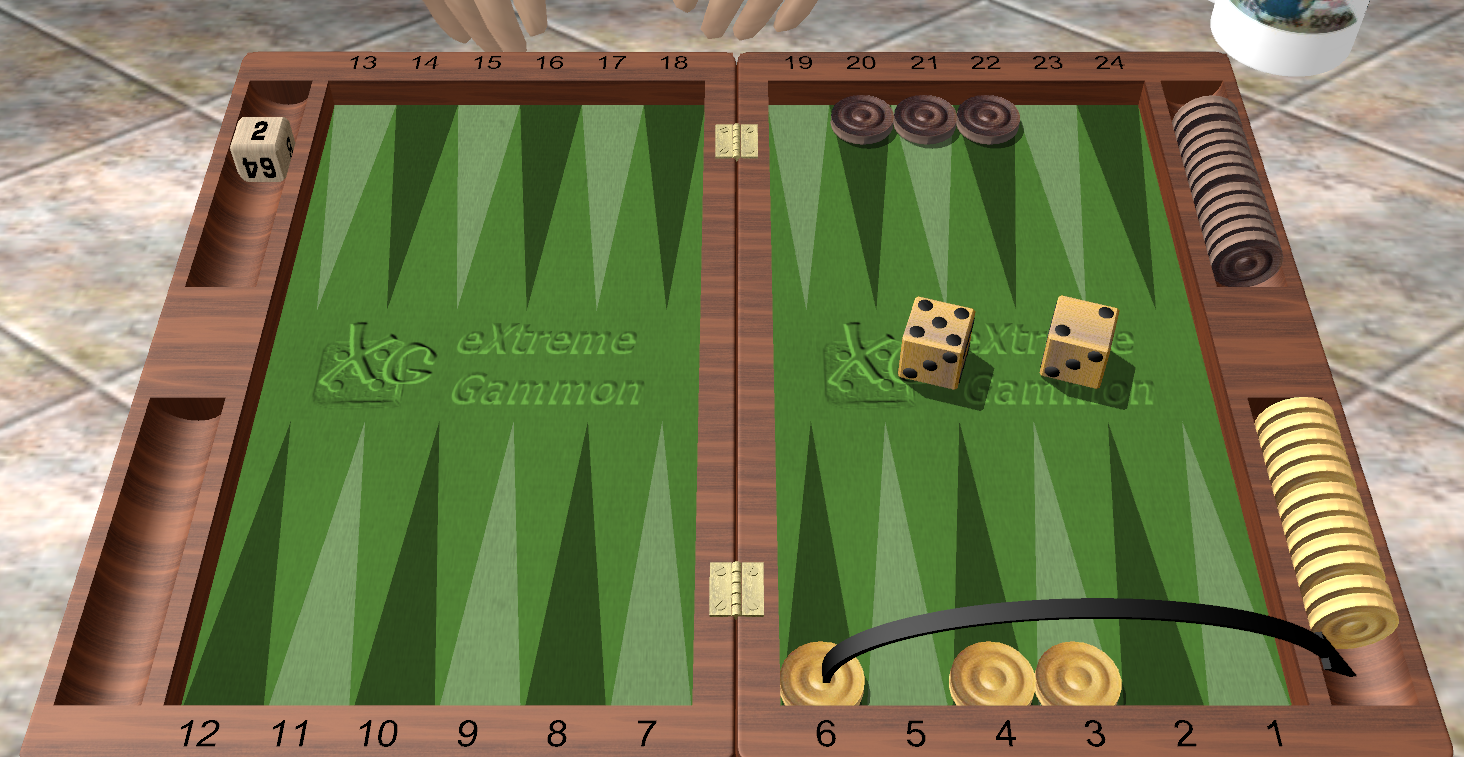Question about backgammon rules
Thread Rating:
Poll
 | 6 votes (75%) | ||
| No votes (0%) | |||
| No votes (0%) | |||
| No votes (0%) | |||
 | 1 vote (12.5%) | ||
 | 1 vote (12.5%) |
8 members have voted
| October 18th, 2014 at 8:09:18 PM permalink | |
| Wizard Administrator Member since: Oct 23, 2012 Threads: 239 Posts: 6095 | Consider this situation:  I thought there was a rule in backgammon that you can't waste movement. So in this situation I moved the chip on the 6 point to 1 and the one on the 4 point to 2. However, the computer rebuked me, saying I should move the chip on 6 to 4, and then move it off with the 5 die. This would have effectively moved only six points, when seven were possible. Have I been playing by a non-existent rule all these many years? The question for the forum is whether the move indicated by the arrow is allowed, despite wasting movement? Knowledge is Good -- Emil Faber |
| October 18th, 2014 at 8:24:19 PM permalink | |
| Pacomartin Member since: Oct 24, 2012 Threads: 1068 Posts: 12569 |
This instruction sheet says yes He calls it "wasting a pip", where pip can mean the points on the die, or the movements in backgammon. Obviously getting one piece off the board, maximizes the probability of bearing the other two off in a single roll of the dice. If both parts of the roll can be played legally, then this must be done. Note that you may play the roll in such a way as to move fewer pips than the larger die indicates by playing the smaller die first --- this is common in bear off situations, and legal as long as each part of the roll is played legally at the moment you play it. |
| October 19th, 2014 at 3:52:34 PM permalink | |
| Johnzimbo Member since: Oct 24, 2012 Threads: 0 Posts: 7 | Agree, I have always played that you can play either die first, in this case 6-4 then 4-off |
| October 20th, 2014 at 7:10:32 AM permalink | |
| Wizard Administrator Member since: Oct 23, 2012 Threads: 239 Posts: 6095 | Thank you for the help. Knowledge is Good -- Emil Faber |
| October 20th, 2014 at 12:54:12 PM permalink | |
| beachbumbabs Member since: Sep 3, 2013 Threads: 6 Posts: 1600 | In my experience: The move you wanted to make is allowed. The move the computer recommended is also allowed. I don't know why the computer wouldn't let you do what you wanted, though as Paco noted, in bearing off, the computer move seems the better strategy. I'm guessing you've been constrained by what you thought was a higher-order rule that said you couldn't take advantage of best strategy if an exact dice-count move is available? (Slightly unclear as to the intent of your question, but I think I get it.) from backgammonrules.net move up a checker If a rolled number corresponds to an unoccupied point - If there is no checker on a higher point, bear off the checkers on the next lower number. - If a checker is on a higher point, bearing off is not allowed. Move the checker towards the exit (play up). •Roll the dice and play up and/or bear off Never doubt a small group of concerned citizens can change the world; it's the only thing ever has |
| October 20th, 2014 at 3:45:28 PM permalink | |
| Wizard Administrator Member since: Oct 23, 2012 Threads: 239 Posts: 6095 |
Much like the games in my Odds site, the player may override the computer's advice, if he wishes. Knowledge is Good -- Emil Faber |
| October 20th, 2014 at 6:49:21 PM permalink | |
| Pacomartin Member since: Oct 24, 2012 Threads: 1068 Posts: 12569 |
I am trying to figure out how often this exception would come up in years of casual play. My guess is not that often. Unless you had a helpful opponent, you might not have missed it. Should your opponent Double the bet (if it is his turn)? A) if white bears the single man off the board leaving the 3-4. Brown bears all three men off with double 4, 5, or 6. I would say no B) if white bears no-one off the board leaving the 1-2-3. Brown bears all three men off with double 4, 5, or 6. White bears two men with 3-4,3-5,3-6,4-5,4-6,5-6 so he leaves a single man 21/36 rolls. I would say double, and gamble against white getting a double 2,3,4,5, or 6. So that move may have cost you double your bet. |

